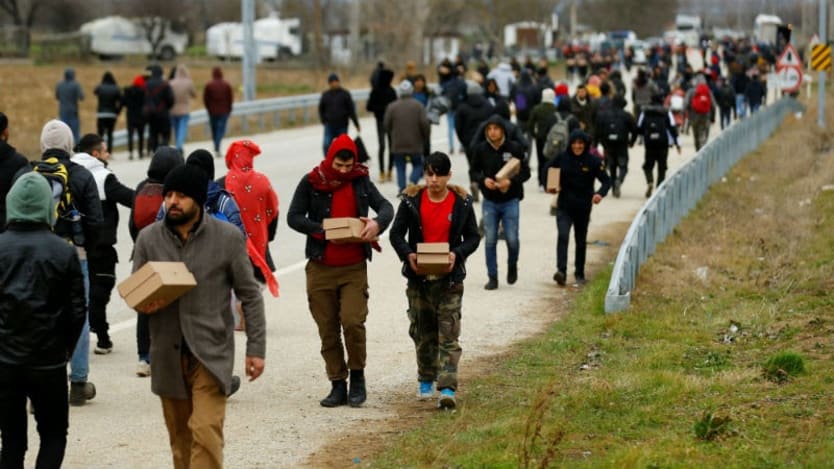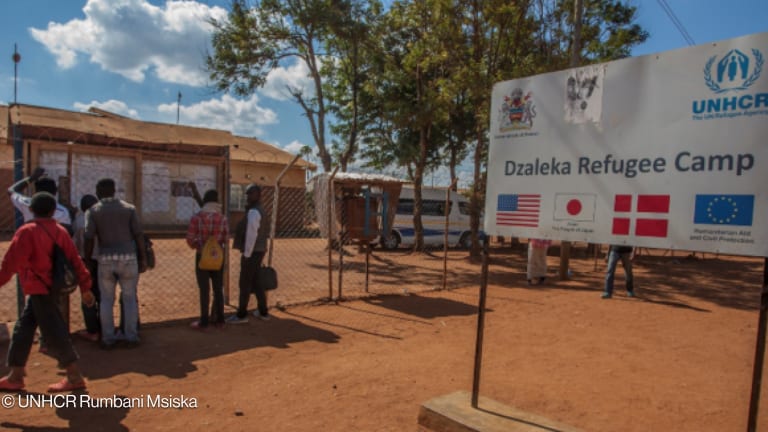
Following political events in Syria and Turkey over recent weeks, the 2016 Turkey-EU refugee deal is deeply unstable, which is unsurprising given that Turkey was already hosting 4.1 million refugees. The humanitarian and development community must take this opportunity to partner with government, local authorities, and international institutions to provide opportunities to better support refugee resettlement.
At December’s Global Refugee Forum in Geneva, there was a collective agreement that more refugee resettlement is required, which provides an orderly and responsible way to help alleviate the refugee crisis.
IFRC calls for Greece-Turkey border solution ASAP
As tensions mount at the Greece-Turkey border and thousands of migrants and refugees are without access to basic services, IFRC president Francesco Rocca calls on the EU to act fast and provide a more dignified solution.
As things stand, less than 1% of refugees are resettled and the world’s least able countries are bearing the brunt of this. Europe must be part of this effort, and development and humanitarian agencies offer an important role in ensuring that refugees who are resettled thrive within their communities and help contribute to their new country’s economy.
The counternarrative to this is that cities are full, unemployment rates high, and social services already under pressure. But these arguments can be combated by responsible resettlement, with development agencies helping to support and ensure long-term growth across Europe.
Shifting blame and responsibility
All people have dreams, hopes, and expectations for the future. Yet when forced to leave their homes because of conflict, they have to gamble on a journey across the Aegean to Greece, try to navigate increasingly hostile European borders, and make it to safety where they can rebuild their lives. I heard such stories firsthand back in August 2016. Yet the EU still has not implemented an effective and humane strategy to manage refugee flows and harness the benefits that refugees offer welcoming countries.
Most recently, the Idlib offensive has forced about 1 million more people to flee Syria. Earlier this month, Turkish President Recep Tayyip Erdogan announced he was opening Turkish borders to refugees seeking to enter Europe. But Greece responded by sending soldiers and guards to its borders to prevent the refugees from entering EU territory. Greek Prime Minister Kyriakos Mitsotakis announced that Greece would suspend asylum registration for a month. Turkish news indicated that at least one man died after being shot, and a child drowned after a dinghy capsized off the Greek coast.
Greek refugee camps are overcrowded and dangerous. There are reports of sexual violence, harassment, and clashes with the police. Similar issues are reported in refugee camps in Bosnia and Herzegovina, Serbia, and elsewhere along the refugee route. On March 12, European Union leaders traveled to Greece and stated that the country must uphold the right of asylum.
But to place the blame solely on front-line countries, including Turkey, is to deny the moral responsibility and legal obligation of other, much richer European countries to do their part. The shameful 2016 deal with Turkey, intended to keep refugees out of the EU, exposed the reluctance of many EU member states to shoulder their responsibility. Now that it has broken down, border states such as Greece are again bearing the brunt of the crisis.
The U.K., having left the EU and abdicated almost all of its responsibility, immediately pulled out of the Dublin system and continues to refuse to take even the 3,000 vulnerable children it pledged to resettle by 2020.
But the problem will not go away. Even if the truce between Turkey and Russia holds, refugees will continue to seek safety in Europe. Humanitarian crises in Syria, Libya, West Africa, Yemen, and elsewhere continue to force people to leave.
How development and humanitarian agencies can help
Resettlement offers an opportunity for development actors to support the integration of refugees arriving across Europe. They can provide models to ensure that those who are resettled are able to thrive and therefore offer economic progress for the country as a whole.
Development and humanitarian agencies offer a unique lens to help address the situation and work with governments across the continent to ensure that refugees are resettled and protected. Together with civil society, agencies also play a part in enabling refugees to integrate and to provide long-term benefits to their host countries.
First, NGOs can partner with state governments such as Italy, Greece, Bosnia and Herzegovina, and Serbia to provide emergency services and programs that will help ensure refugees are given enough protection and support in hot-spot entry areas to Europe. The services NGOs can provide will relieve pressure on border forces and support border communities in their efforts to deal with often disparate situations and the threat of violence.
Second, NGOs and development agencies can offer their expertise in providing services that boost the capabilities of refugees to contribute to their countries’ long-term prosperity. Media reports often portray refugees as a burden or cost factor and overlook the many ways in which refugees and migrants contribute to host societies, often on a voluntary basis or by filling skill shortages in the social and health sectors.
Thirdly, development agencies can also engage with local authorities and city mayors. For example, the Swiss city of Zurich has opened a temporary settlement for refugees that combines living space with small business and cultural and educational programs. Meanwhile, in Bristol, England, the mayor has lobbied for a right for asylum-seekers to be allowed to work. Development agencies can help these efforts by offering their skills in designing context-specific programs.
Across Scandinavia and in Germany and France, development agencies are involved in providing language and skills training, along with designing innovative programs that ensure refugees integrate and, in time, turn their unique cultural skills, energy, and hope into tangible benefits for society as a whole.
Europe has failed to put an acceptable strategy in place to deal with the refugee crisis for too long. This is both inhumane and irresponsible. But the latest refugee crisis from Idlib, which has forced the EU to look again at the Turkey refugee agreement, provides an opportunity to address this situation. European countries, acting jointly, have the capacity and resources to harness these brave and mistreated people, but it needs support from development and humanitarian agencies to harness the unique characteristics offered by refugees that can help build their countries’ future.









